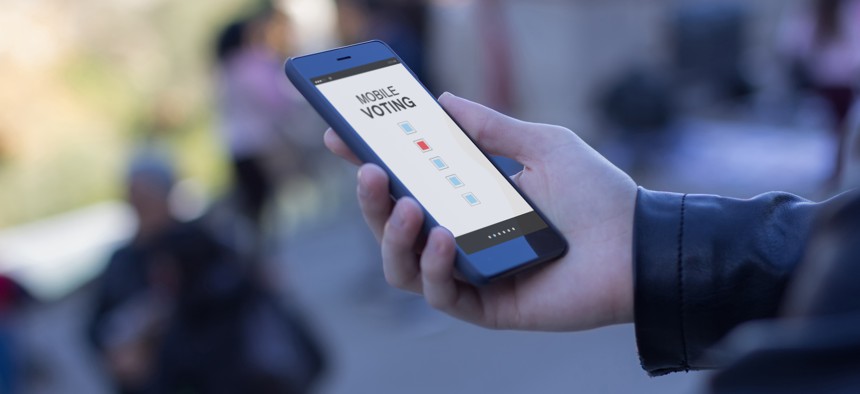Casting Ballots by Smartphone or Tablet? Elections Officials Want to Expand Online Voting Pilots

Shutterstock / Pinone Pantone

Connecting state and local government leaders
A Utah county and West Virginia were among the places that allowed some voters to cast electronic ballots last year.
Elections officials in places that gave certain groups the option to cast ballots online in last year’s presidential election are advocating for the expansion of the practice through broader pilot projects.
Both Utah County, Utah and the state of West Virginia used this type of mobile voting to enable military members stationed overseas and people with disabilities to cast ballots in the November election.
“We had 1,562 people vote electronically. Those aren’t huge numbers, but we are showing we are moving from the crawl to the walk stage,” West Virginia Secretary of State Mac Warner said Thursday during a panel discussion hosted by the Mitre Corporation on the future of election security.
Some experts have raised concerns about the security of mobile voting systems. Warner said he isn’t advocating for across-the-board mobile voting, especially until it “has been proven and accepted.” But he also said election officials have a responsibility to ensure that people who want to vote have the ability to do so. He believes that providing electronic options can help address that challenge.
States made numerous changes to expand absentee and early voting access during the coronavirus pandemic and many state lawmakers are currently debating whether or not to make those changes permanent. State and local elections officials highlighted both successes of the 2020 election and vulnerabilities it exposed during Thursday’s panel.
By vetting online voting systems through pilot programs, election officials would be able to better test their capabilities, said Utah County Clerk and Auditor Amelia Powers Gardner. That could provide elections officials with a contingency plan in the case of an emergency like the pandemic or a natural disaster.
“If I’m not accepting a mobile ballot, I’m accepting a ballot by email and that is less secure,” Powers Gardner said. “We need to recognize that we don’t work in a vacuum.”
Another way to continue to improve election security would be for the federal government to offer a consistent funding stream to state and local elections administrators to help cover the cost of security upgrades and training, said Ben Hovland, chairman of the U.S. Election Assistance Commission.
Disinformation that sowed doubt about the legitimacy of the presidential election created problems for election officials last year, and election experts warn that state and local officials may need to do more to educate the public about the election process. In Georgia, for instance, erroneous accounts from poll watchers who were credentialed by political parties to monitor the state’s recount of the presidential contest led to false claims of election fraud.
To address those types of problems, Georgia Secretary of State Brad Raffensperger said the next time poll watchers are brought in to observe vote counts, he wants them to have better training about how post-election audits and recounts work.
“So there is an understanding of what the poll workers are doing,” he said.
Andrea Noble is a staff correspondent with Route Fifty.

NEXT STORY: Lawmakers Call for Federal Program to Upgrade Unemployment Systems




